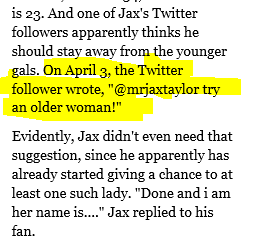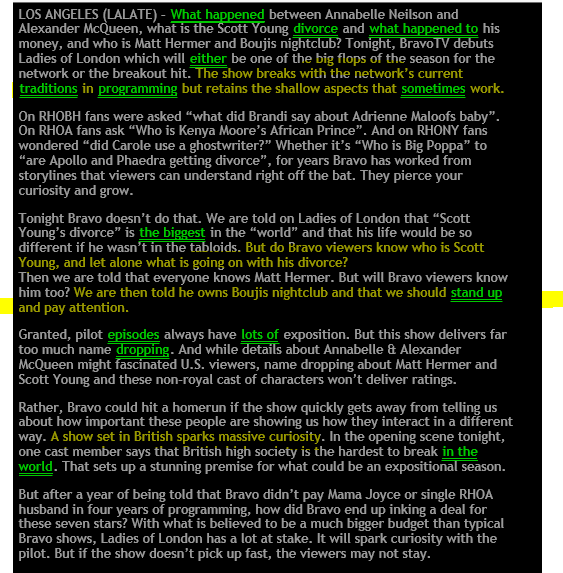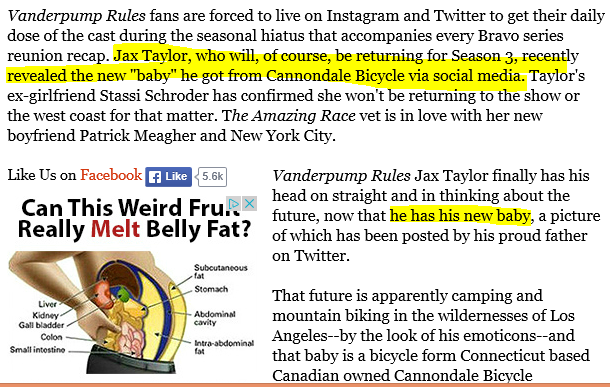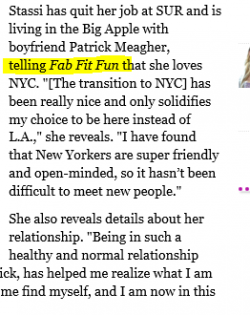I am not an SEO professional. I am an average blogger with average knowledge of optimization. That’s not to say that I am not an intelligent person. I have a Bachelor’s degree in Communications and a minor in English Literature. I went to the writing school at UCSD. So I know the basics about writing quality content.
This site was started in 2011 and we started with a Google rank of 0–understandable since everyone has to start at the bottom. We blogged religiously never using keyword stuffing or purchased backlinks or Black Hat tactics at all–just good ‘ol fashioned hard work.
We started the blog simply because we loved the show The Bachelor and thought it would be fun to start covering the bevy of ridiculous situations that ensue on and off camera.
But we discovered the world of internet blogging was far from ‘fair’ and that for all of Google’s claims that ‘content is king’, their algorithms still reward vice not virtue.
The new algorithm does not fix the following SEO manipulation schemes:
Horrible Content:
For some reason no matter how smart the nerds at Google are they can not differentiate good content from horrible content and when I say “horrible” I mean it. This website LALATE ranks a 5 and this is what passes for content. Read the highlighted sentences. This article is not an anomaly for them or other highly ranked sites. It’s pretty normal.
The Bait and Switch
The Bait and Switch is one of the most insidious and infuriating schemes that sites use to get clicks. Wetpaint is the KING of the Bait and Switch. And yeah every once in a while they will have a real nugget of intel, but it is rare. I’d say for every 99 B & S posts they have 1 legit post.
But somehow Wetpaint has tricked the Google Gods into thinking they are a high-quality site delivering quality content. In fact Google even treats WP as a legit news source!
The Bait and Switch would go something like this:
Title: “Are Sean and Catherine pregnant?” (knowing that now that they are married everyone will be on pins and needles waiting for a pregnancy announcement)…so they use these key words in the title. Click, “no, they are not BUT they posted on Twitter that they had “great news to announce” so everyone thought they were pregnant, but Catherine is just starting her own blog, but the two have said before that they would like to start a family soon”.
Ok so all the fans looking for “Sean and Catherine pregnant” are suckered into clicking this headline. They get all the traffic for anyone looking for those terms when there is NOTHING to report on for those terms. WP does this again and again and again. And every time I get suckered into clicking I wanna throw my computer against the wall.
It’s intentionally manipulative and Google should come down hard on this super shady scheme to trick readers into clicking on non-stories.
Here are the top 3 results for Emily Maynard. Story 1, click…the life decision? She is contemplating bangs on Twitter
Story 2, click, Her and her fiancé are adopting a dog.
Story 3, “Wedding Bands”? They made a comment on Twitter about hiring a band to play at their wedding.

“Google News”: Top 3 results for “Emily Maynard” all Wetpaint
But Wetpaint isn’t the only site that loves the bait and switch. Their buddy Classicalite also LOVES to click-bait readers.
Now, guess what the “baby” was?
How many people would have clicked on this article if they new the “baby” meant Jax got a new bike? This is clearly intended to manipulate people into clicking articles with deceitful headlines.
The Big Circular Linking Schemes
Then I noticed that these big websites a the top of the Google cue would often link to one another–and they were gratuitous links. I observed The Inquisitor, Fashion & Style, Classicalite, The Examiner, WetPaint, Heavy.com…just to name a few appear to all be giving one another gratuitous unearned links in a circular or triangular pattern which is usually done to circumvent Google’s crackdown on link trades.
They would link to someone like The Examiner who was not the source of the story. They would give a site like The Examiner the source cred when the site was just sourcing someone’s blog. Here is the PERFECT example. This new blog Fashion & Style is sourcing The Examiner when The Examiner is sourcing this quote to someone else:

- Fashion & Style credits “Examiner”, Examiner credits Bravo
Now I get that mistakes in sourcing happen. No one is perfect. But I began noticing a pattern. The same group of a dozen or so sites were all linking to one another. In fact, the pattern I really noticed is that 1 of the dozen or so sites would actually link to the source—like a blog of one of the contestants–like an ABC blog or a Bravo blog–easy to source (a site not involved).
Now when you click here is who The Examiner sources for the exact same quote:

- F & S sources The Examiner and The Examiner sources Bravo in what appears to be a circular linking scheme. An effort to give a site link juice by erroneously giving them credit when they are not the source.
Then the other 11 sites would not link to the blog. Instead they linked to their guy The Examiner-ish site) who first sourced the blog, thus giving him all kinds of link juice. So the actual source would be pushed way down on the Google cue and people would erroneously believe the #2 guy was the source.
Here is another classic example and its this same “group” of sites. I have noticed this a lot with this site Classicalite. Classicalite is NOT the source! The Bravo blog IS. But Kdramastars instead gives the link juice to Classicalite.

- Website credits ANOTHER site for crediting a blog.
Ok here is another example:
This site Classicalite which always seems at the top of Googles cue for anything related to Vanderpump Rules or Bachelor writes this non-story implying that Jax Taylor has a new girlfriend. They credit Wetpaint who hasn’t done anything. They are not the source of this info. They did not ask the question. Classicalite should be sourcing and linking Twitter but links Wetpaint instead. Below is an excerpt from Wetpaint’s article quoting a random fan on twitter.
If this just happened once or twice I’d say it’s just an oversight but I have noticed these same sites doing this again and again and it appears to be a link scheme to keep them at the top and anyone not “in” the group on the bottom.

- This site Classicalite credits Wetpaint for a random tweet on Twitter. Wetpaint is not even the source of the question Jax is responding to.

- Here is Wetpaint’s article showing it was just a random tweet from a fan. Twitter is the source, not Wetpaint. Its not even Wetpaint ON twitter asking the question.
And ANOTHER example of Classicalite inappropriately crediting Wetpaint. Interesting that they always seem to give Wetpaint an erroneous credit when someone else is the source:
And here is who Wetpaint credits….FabFitFun.
And to make matters worse, these sites Classicalite, Wetpaint, The Examiner are all NEWS sites on Google! All of these poorly written, non-stories show up as “news” stories in Googles search engine as well as “web” stories. It just seems like such an insult to actual news sites that have some journalistic standards for reporting and sourcing to lump them in the same category.
The Big Sites Have Very Sophisticated Software to Track Keywords and Competitors
We started writing about 25 posts per month, but the posts were meaty. We were going for quality, not quantity. And we came up with some great ideas to research and write about that no one else was covering on the show, but that fans were looking for–like thus far none of the blogs were looking into the religious or ethnic backgrounds of these D-list celebrities. So we started building a bit of a niche in that keyword market.
So little did we know that the big sites like Wetpaint are armed with very sophisticated software that tells them how competitors are doing.

From a Wetpaint editor’s LinkedIn profile. This is how these sites work. They use software to give them the keywords to write their stories on. Stories are based on search term demand. Sites essentially become content farms.
So the second one of these posts blew up with traffic Wetpaint would immediately print a similar story with no credit. Suddenly their post took the top spot and the other big name sites would then copy Wetpaint and link to them. Eventually we got them to give us a link on ONE ‘ethnicity’ post, but that was like pulling teeth and even after we got the link credit WP still was the top spot in the Google cue and still is to this day.
Clearly creativity is not WP’s strong suit. But what is wrong with Google that it does not have an algorithm that at least rewards the site that breaks the story first and doesn’t reward the copycats?
Content Managed by a Different Company
What I discovered is these writers who write for sites like The Examiner will also write for a bunch of other sites that follow the D-list celebrities like a Wetpaint which makes a linking scheme REAL easy. (Again, I can only testify to the specific niche I cover which is D-List celebrity situations, but I think my experience is important in exposing problems with Google’s algorithm.)
So in an epic effort to try and get a proper source cred I eventually had to go on to the DCMA registration page to just find a contact. I found the contact for this one D-List celeb site, but he did not actually work for the site itself but worked for a big company who actually managed the content for a BUNCH of these sites…ding ding ding.
The company was called Skyword. I had never heard of them before. But in my effort to try and get a hold of a specific author, I discovered the author wrote for multiple sites that were managed by this company. This is an excerpt from that writer’s LinkedIn profile showing she works for multiple sites which cover the same niche.

This author is typical. They are Freelance and write for multiple sites all w/ similar content making linking schemes quite easy.
Suddenly it made sense why getting proper credit was like an Olympic marathon of jumping through hoops and trying to track someone down. It appeared that one company was coordinating the content for multiple sites which could make a big link scheme really easy. I imagined there was a list and if you were not on the list you would not get cred period.
I could see how easy this would be. I was infuriated at the thought that these sites would soar to the top of Google page rank with such ease when the content seemed so subpar and seemed identical from site to site and was just being rolled out like an assembly line. NTM the sites had JUST been created in 2014. The problem has only appeared to have gotten worse in the last few months.

This ONE company has over 20,000 freelance writers who can write and manage your content and help your ranking? Can you see the obvious opportunity for manipulation here?
I want to be careful about making specific accusations, but these appear in my opinion to essentially be internet mafias who shut down the little guys with these complex linking network schemes. In short ‘I rub your back, you rub mine’–except instead of 2 sites it’s 10 or 20 and there are managers who manage the content from another company for the sites. It looks like you can contact them to be a ‘partner’ wink wink.
Then they probably look at your Page Rank if it’s say a 4 or lower you may have to cough up a little cash to ‘join’ the group. If its a 5 or above, maybe you can actually be ‘paid’. Or, more likely it’s all done on a point system. If you have a high ranking you probably start with a bunch of free points that you can exchange for link love. Again, I am speculating here. But this is what I am getting because otherwise all the gratuitous links make no sense. Why give a competitor a link if you don’t have to?
But again, why hasn’t Google addressed this? These schemes undermine Google’s credibility and ultimately their bottom line. They cheat the customers who are often missing out on the BEST information because the exact same sites monopolize the top spots for all the search terms associated with certain categories (in my case these 2 shows) due to all this artificial link cred. Google STILL does not seem to be able to recognize quality in their search results.
Sites Who Avoid Giving You a Proper Source Credit
This brings me to another issue of Google rewarding sites who avoid giving proper credit to the original source by blurring the lines between “rumor” and “speculation”. These writers who say things like “there are rumors that Stassi Schroeder is getting her own show”…and will say it’s ‘speculation’ on their part so it doesn’t require a credit. Well, we were the only source of that specific rumor (as an example) and again the sites refused to give a credit.
When I confronted the writers on this, their claim was that it was mere ‘speculation’ on their part even though it’s clearly described as “rumor”. I could not believe I had to give a speech on the difference between ‘rumor’ and ‘speculation’ to writers of these big highly ranked sites.
After jumping through several hoops to get a contact person, I finally got someone to agree a source cred was needed, but before the credit could be given the company was sold and now I am back to square one. Meanwhile the site who took the info from our source without a credit is still outranking us by a mile.
The thing is, I should not have to track these writers down. This is Journalism 101, BUT the other thing is, why does Google keep rewarding these fly-by-night sites who don’t actually care about the content they are writing and who don’t even know when a credit is needed and when it is not?
They are just using computer programs to figure out the highest ranking search terms so they can write accordingly to maximize profits. And they are like content sweatshops–just pumping out low-quality content geared at using search terms. Many times the titles just use a ‘bait and switch’ technique. When you click on the article the information promised in the title is nowhere to be found.
One example was an article I found titled “Stassi Schroeder confirmed to come back for season 3”. You click on the article and there is nothing in it that “confirms” she is coming back. Its meaningless speculation based on really un-compelling non-evidence by the author.
Another example: Wetpaint just came out with a story about “Emily Maynard adopting a baby boy”, click….she has adopted a dog….story via Twitter. Its actually infuriating even as a fan searching for info and getting tricked like that. I am shocked Google has not penalized this sort of behavior, because it is so intentionally deceptive.
So you would think Google would fix this and Matt Cutts always claims that they have, but they have not. If anything these linking network schemes just keep getting more successful and more sophisticated. Meanwhile the customers get cheated and lose out on finding the best content available. Because the best content gets shoved to the bottom as the sites with integrity are passed over while the sites that game the Google SEO algorithms with low quality content and sophisticated linking schemes continue to gain more and more credit.
Tell Google to get it together and please fix this situation!
Related articles








